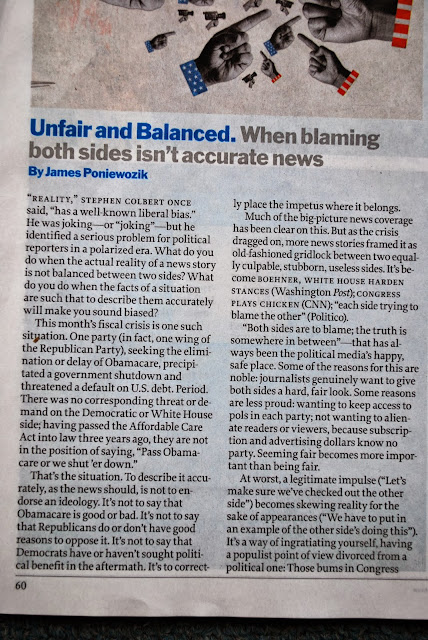This week's Time magazine, Oct. 21, had a thoughtful and articulate piece by James Poniewozik in his "Tuned In" culture page. Normally he reviews television, movies or trends and such. However, the culture of our media "The Fourth Estate", (as I share definition of below) is relevant today for our culture, for our understanding as we ingest media coverage of events, and most importantly, for our understanding of the road that our democracy seems to be taking in this past decade and more.
As it turns out, the Times article (October 21, 2013 "Unfair and Balanced") is not yet posted online, however I did photograph it, shown below.
And then, I found Poniewozik's online version that he posted on October 7th:
Read it here: why-false-equivalence-matters-in-the-shutdown-showdown
As a personal writing note, I find it interesting to see the editing choices made by Time as they removed perhaps disparaging quotation marked words and unnecessary parenthetical additions. Fair.
"Reality doesn't always have a bias - liberal, conservative or otherwise. But when it does, it's not journalism's job to rebalance reality."
His last two lines say it all. It is my prayer (and my push in posting links on FB) that we can still use a person's thoughts and words, researched, truthful and clear of "false equivalence" to get back our democracy and our personal stake in it.
"The Fourth Estate"
In United States English, the phrase "fourth estate" is contrasted with the "fourth branch of government", a term that originated because no direct equivalents to the estates of the realm exist in the United States. The "fourth estate" is used to emphasize the independence of the press, while the "fourth branch" suggests that the press is not independent of the government.[12]
Don't confuse the two.
And to define further:
"the Networked Fourth Estate as the set of practices, organizing models, and technologies that are associated with the free press and provide a public check on the branches of government."[14]
"It differs from the traditional press, the traditional fourth estate, in that it has a diverse set of actors instead of a small number of major presses, these actors include small for-profit media organizations, non-profit media organizations, academic centers, and distributed networks of individuals participating in the media process with the larger traditional organizations."[15]
- 12: Martin A. Lee and Norman Solomon. Unreliable Sources (New York, NY: Lyle Stuart, 1990) ISBN 0-8184-0521-X
- 14: "US vs Bradley Manning, Volume 17 July 10, 2013 Morning Session" (PDF). Freedom of the Press Foundation: Transcripts from Bradley Manning's Trial. July 10, 2013. Archived from the original on
|archiveurl=requires|archivedate=(help). Retrieved 11 July 2013.
- 15: "US vs Bradley Manning, Volume 17 July 10, 2013 Afternoon Session" (PDF). Freedom of the Press Foundation: Transcripts from Bradley Manning's Trial. July 10, 2013. Archived from the original on
|archiveurl=requires|archivedate=(help). Retrieved 11 July 2013.
Recently I watched the 2003, very graphic and emotional film set in Civil War time, 1864 "Cold Mountain" and the words spoken by "Ruby" stuck in my head:
"Every piece of this is man's bullshit. They call this war a cloud over the land. But they made the weather and then they stand in the rain and say 'Shit, it's raining!'"



No comments:
Post a Comment